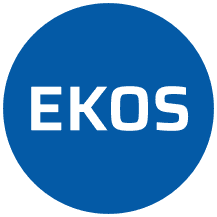EKOS
The development of a new concept to ensure successful medical care for rare, highly contagious and life-threatening diseases within tertiary care hospitals
EKOS Logo
Image: EKOSFunded by the German Federal Ministry of Education and Research (BMBF)
Funding Period: November 2016 – December 2021
Project Partners: Robert Koch Institut; Freie Universität Berlin; Technische Universität Braunschweig; Technische Universität Berlin; Nordwest-Box GmbH & Co KG
Homepage: https://ekos.rki.deExternal link; https://www.infectcontrol.de/ekos.htmlExternal link
Researchers
Prof Dr. Daniela GröschkeExternal link
Prof. Dr. Stefan Strohschneider
Katharina Hodes, M.A.
Project Description
Climate change and globalisation have radically increased the risk of infection with rare, highly contagious and often life-threatening diseases (HCID). Infected patients often have to receive emergency treatment outside of high level isolation units. Regular hospitals often lack the technical or communicational provisions to administer medical care of such rare diseases in a completely competent manner. In addition hospital staff also needs to come to terms with their own fears and insecurities when caring for patients suffering from HCID.
The interdisciplinary project EKOS (dt.: "Entwicklung eines neuartigen Konzepts zur Sicherstellung der infektiologisch-medizinischen Versorgung von Patienten mit Krankheiten durch hochpathogene Erreger in Schwerpunktkrankenhäusern", EKOS) brings together several partners from the healthcare sector with the task of developing a new concept that may ensure successful medical care of patients with HCID within specific hospitals.
The project aim is to improve the organisational and individual resilience of these hospitals. Focussing on communicative aspects we will develop an integrated concept for communication with patients, staff and public. Contributing factors in relation to organisational and individual resilience also need to be identified and integrated within such a concept. Resilience here is perceived as the ability to maintain positive adjustment under challenging conditions, and to emerge from such conditions strengthened and more resourceful. “Good practices” will be derived, and will later be applicable to other hospitals.
Our empirical project analyses the internal and external communication of the hospitals through qualitative and quantitative methods. A research-tool will be developed, designed and tested to derive measurement possibilities for human resource development, the communicative reduction of social stigma and the prevention of a hospitals’ loss of reputation.
Publications
- Gröschke, D., Müller, N. D., Huber, J. (2021): Erleben und Verhalten von MitarbeiterInnen in deutschen Krankenhäusern: Einblicke aus der ersten Hochphase der COVID-19-Pandemie. In Gröschke, D. & Strohschneider, S. (Hrsg.). Jena Studies in Intercultural Communication and Interactions, 02/2021. Jena: Friedrich-Schiller-Universität. https://doi.org/10.22032/dbt.48323External link
- Huber, J., Hodes, K., Müller, N. D. & Gröschke, D. (2020). Externe Krisenkommunikation in Krankenhäusern: Ein Leitfaden für HCID-Situationen und Pandemiezeiten, In: Gröschke, D. & Strohschneider, S. (Hrsg.). Jena Studies in Intercultural Communication and Interactions, 01/2020. Online verfügbar unter: https://www.db-thueringen.de/receive/dbt_mods_00047290External link
Presentations
- Müller, N. D. (2021). An HCID-scenario and COVID-19: The importance of social support for HCWs in high-risk situations, Presentation at the 29th Annual Conference of the Society for Risk Analysis Europe The Discipline(s) of Risk Science, 14.-16. Juni 2021, Aalto (Finland).
- Huber, J., Müller, N. D. (2021). Vorbereitungen auf das Ungewohnte. Empirisches Forschen zu Covid- 19, Präsentation bei der Sozialwissenschaftlichen Fachtagung Erkundungen des Ungewohnten. Empirisches Forschen in außergewöhnlichen Kontexten, 11.-12. Juni 2021, Universität Passau.
- Müller, N. D., Huber, J., Strohschneider, S., Gröschke, D. (2020). Pandemische Risikowahrnehmung, Präsentation bei der virtuellen Internationalen DACHL-Konferenz Methoden der Risikoforschung, 16. Oktober 2020.
- Müller, N. D., Hodes, K., Gröschke, D., Strohschneider, S. (2019). Szenarienmethode zur Erfassung der Risikowahrnehmung von HCID-Situationen, Präsentation bei der Internationalen Konferenz Methoden der Risikoforschung, 10. - 11. Oktober 2019, Hall (Tirol, Österreich).
- Müller, N. D., Hodes, K., Gröschke, D., Strohschneider, S. (2019). Risk perception in dealing with High Consequence Infectious Diseases, Presentation at the 28th Annual Conference of the Society for Risk Analysis Europe Systemic Risks: From Natural Hazards to Cyber Risks, 24. - 26. Juni 2019, Potsdam, Germany.
- Hodes, K., Müller, N. D. (2018). Hochkontagiöse Patienten: Fallgeschichten von Experten für emotionales Lernen nutzen?, Workshop at 21. Plattform Menschen in komplexen Arbeitswelten e.V. Jahrestagung Kritische Situationen – Analyse von Ereignissen / Lernen aus Ereignissen, 20. - 22. Juni 2018, Frankfurt a.M., Germany.
- Gröschke, D., Hodes, K., Müller, N. D., Strohschneider, S. (2017). Circumspection is half the battle – or not?, Poster presentation at Strategy Conference – Visions for Infection Control, 14. - 16. Juni 2017, Jena, Germany.
Additional information
Project Information EKOSExternal link





